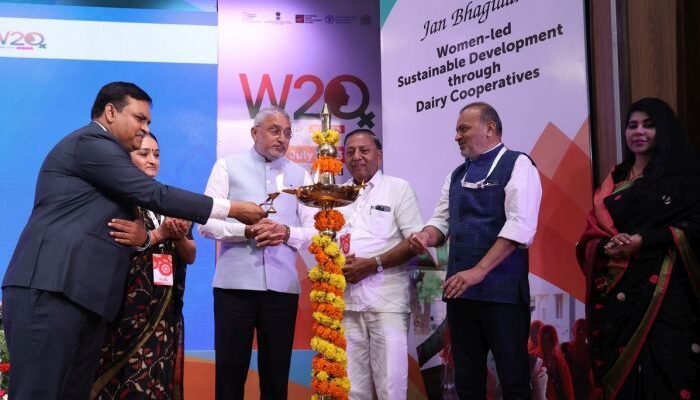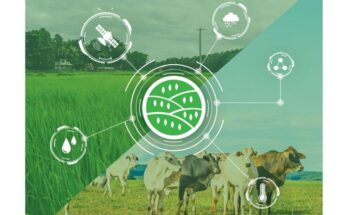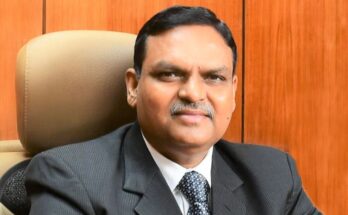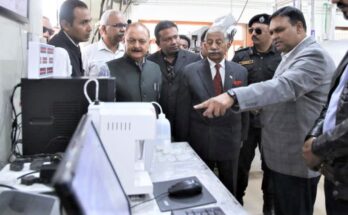National Dairy Development Board (NDDB), Gujarat Cooperative Milk Marketing Federation Ltd (GCMMF), and W20 organised a one-day event on Jan Bhagidari – Women-led Sustainable Development through Dairy Cooperatives under W20, an official engagement group of G20 at NDDB, Anand on 20 July 2023.
On the occasion, Jagdish Vishwakarma, Minister of State for Cooperation, Government of Gujarat said that women should take the lead in managing dairies and cooperatives. We need to work for reducing the cost of milk production in order to raise profit and technological interventions will address the challenge of shortage of workers, which our women dairy farmers are aware of. We can think of having community cattle sheds in villages and take up fodder production commercially to tackle fodder scarcity.
In his video message, Parshottam Rupala, Union Minister of Fisheries, Animal Husbandry & Dairying advised the delegates to focus on the changing role of women in the dairy sector from women-oriented development to women-led development.
Rupala also said that there are 18 all-women dairy cooperatives and through these women have achieved economic independence and social recognition. The new cooperative policy of Government of India has also set a target of involving more and more women in the cooperative sector.
About 700 women dairy farmers representing cooperatives and producer organisations from across the country participated along with delegates from USA, France, Italy, UK, Kenya and Argentina, officials of the Central and state governments, revered institutions related to the dairy sector, and other stakeholders.
You may also like to read: NAAS, RAPL, Agriculture Post to host AgriTech Summit-cum-Investor Meet on August 8, 2023
In her address, Dr Alka Upadhyay, Secretary, DAHD informed that India accounts for 24 per cent of global milk production. It is the collective responsibility of women to ensure the better health of livestock because it is directly linked with human health. Timely vaccination must be undertaken, and we must also aspire to become the vaccine hub of the world for animal vaccines. Another key challenge includes balanced nutrition for livestock as well as reduced use of antibiotics. Integrating the service sector with dairying will enable women and the younger generation to take up marketing, financing and other activities related to animal husbandry and dairy management in the future.
Dr Meenesh Shah, Chairman, NDDB said that we’re fortunate to host so many women leaders from across the country today. Without the contribution of women dairy farmers, Indian dairying wouldn’t have reached the pinnacle of success that we see now. He also congratulated all women achievers for being the beacon of light for millions of women out there who will get motivated by their achievements.
Dr Shah conveyed that NDDB would implement the Zakariyapura model in 25 other locations to set up biogas plants through women’s contribution under the government’s Gobar Se Samriddhi initiative. The Dairy Board will continue to promote the inclusive growth of women by ensuring progressive change in the role of women dairy farmers from household dairy activities to entrepreneurial and governing roles in dairy cooperatives and other related institutional structures.
Speaking about the contribution of women in the dairy sector, Shamalbhai Patel, Chairman, of GCMMF, said that Gujarat has played a key role in putting the dairy sector on the global map. Women in the dairy sector are in fact catalysing the upliftment of society both economically and socially through their participation. We’re grateful to the Union and state governments’ support and NDDB’s technological guidance to empower, educate and upskill women to adopt sustainable dairying practices to improve yield. We are proud of the fact that about 12 lakh women are associated with GCMMF.
You may also like to read: Advanta, nurture.farm partner to launch Nutrifeed Germination Scheme for forage crops
Dr Sandhya Purecha, Chair, W20, said that W20 has organised 165 events covering 15 states including task force meetings, Jan Bhagidari meetings, and discussions with policymakers. Dairy cooperative model has been long recognised as a successful model in enabling women to become catalysts of sustainable development by providing them market access and augmenting their income.
Jayen Mehta, MD, GCMMF conveyed that Amul is the best example of women-led cooperative development. At the foundation of Amul’s resounding success are the women dairy farmers. India and Amul can set an example for the world on how women are at the centre of the milk revolution across Gujarat and across the country. In fact, 26 per cent of women are on the board of various milk unions whereas some 77,000 women (38 per cent) are members of the management committees of village dairy cooperative societies at Amul. I am thankful to W20 for making Amul an institutional partner.
Bharati Ghosh, Ex-IPS mentioned that she was privileged to be present on this occasion of Jan Bhagidari. She informed that India is home to 12 million self-help groups (SHGs), 88 per cent of which are all-women members. A total fund of 5.5 lakh crore has been disbursed, which has opened up a plethora of opportunities for women.
The Jan Bhagidari event highlighted the role of the dairy sector in empowering women through a series of success stories from across the country. Women members of cooperatives and producer organisations shared their journey of resilience. Success stories of women dairy farmers covered key priority areas of W20 – women entrepreneurship, grassroots women leadership, bridging the gender digital divide, education & skill development, and climate action.





